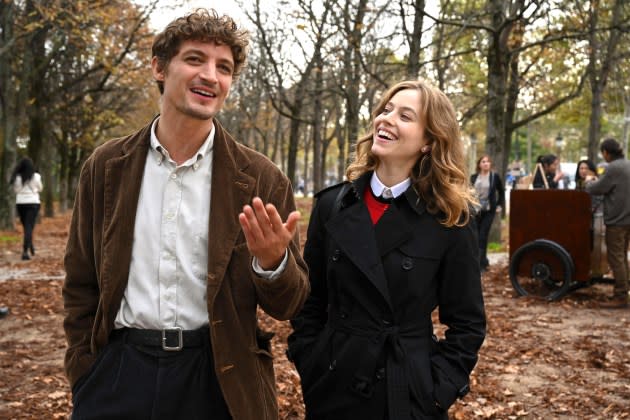‘Coup de Chance’ Is Woody Allen’s Best Film in a Decade
- Oops!Something went wrong.Please try again later.

We are told to judge the art rather than the artist, but sometimes the artist makes this difficult. Woody Allen still carries loud freight – the freight of someone who was accused by his daughter, Dylan Farrow, of child sexual abuse. People will argue that none of the above matters, that he has been convicted of no crime, that only what is onscreen counts. And so we try to watch Coup de Chance, an adequate seriocomic immorality tale that had its world premiere Monday at the Venice Film Festival, with eyes and minds wide open. Allen may be largely shunned in the states, but he’ll always have Europe.
This is Allen’s first foreign-language film, set in contemporary Paris, but it touches on some of the filmmaker’s favorite themes and devices: chance and fate; love, infidelity and murder; what it all means once we enter the existential void that has fascinated Allen for eons (this is a filmmaker who for a time practically made a fetish of Ingmar Bergman, even employing the Swedish master’s cinematographer, Sven Nykvist). In Coup de Chance one character, a novelist who lives in a lushly lit loft, actually says, “What a farce life is. A black farce.” Quel dommage!
More from Rolling Stone
Richard Linklater Says Muse Glen Powell Has 'A McConaughey Quality'
'Priscilla' Shows Elvis's Dark Side, and Is Sofia Coppola at Her Best
Priscilla Presley Clears Air About Dating Elvis at 14: 'I Never Had Sex With Him'
The novelist, Alain (Niels Schneider), is in love with Fanny (Lou de Laâge), whom he longed for when they were classmates in New York. Fanny is now married to Jean (Melvil Poupaud), a ferrety titan of finance with a shady past. Alain is a romantic who reminds Fanny of a better, more bohemian self she used to be. Jean is a controlling cad who collects wealthy friends, makes a show of hunting deer in the country, and gushes over his antique train set (privilege and childishness, all in one handy metaphor). You might also recall that a train set figures prominently in the allegations made against Allen by his daughter, Dylan Farrow. But now we’re getting back into biography. And perhaps that’s the filmmaker’s intention.
Coup de Chance moves briskly, which means two things: the film is well-paced, rendered in mostly short, crisp scenes; and it tends to skim over the surface, using its characters to make philosophical points within a larger scheme. Jean, who insists (more than once) that he makes his own luck, is willing to do bad things (or have bad things done for him) to reach his desired outcome (think Martin Landau’s ophthalmologist in Crimes and Misdemeanors). He scoffs at Fanny when she buys a lottery ticket. His worldview leads to a crowd-pleasing comeuppance, a sense of schadenfreude earned by Poupaud’s sleekly malevolent performance (he looks a little like Alain Delon, the great French star whom Fanny namedrops as someone too old for her to have an affair with, along with Mick Jagger). The whole film is well cast, including Laâge, Schneider, and Valérie Lemercier as Fanny’s mother, who smells something rotten in this game of luck and takes it upon herself to start poking around.
The last ten years or so have been pretty fallow for Allen, but he has managed to hitch himself to Vittorio Storaro, the storied Italian cinematographer who has shot everything from Apocalypse Now to The Conformist. Coup de Chance has some of the latter film’s autumnal hue, captured most notably in the film’s forest denouement. The film also gives Allen a chance to indulge his passion for jazz; Herbie Hancock’s “Cantaloupe Island” becomes a sort of musical motif, striking an appropriate tone somewhere between jaunty çand contemplation. It’s a tricky balance, and Allen’s screenplay, which grows a bit labored in the plot department, manages to strike the right mood throughout.
Coup de Chance is a pretty slight and minor film, but for an 87-year-old American working in a second language, it can’t help but seem impressive; it’s certainly as good as anything Allen has made since 2013’s Blue Jasmine. You can forgive the ostentatious name dropping of literary touchstones (the poet Stéphane Mallarmé, Tolstoy’s Anna Karenina), because Allen has been doing that for years. You can even accept the existentialism-for-dummies tenor of Alain’s novel as Fanny reads it at the end of the film. The closing words, “Best not to dwell on it,” could be a mantra for the filmmaker in real life. Were it only so easy.
Best of Rolling Stone
